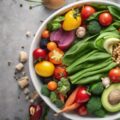As we go about our daily lives, it’s easy to forget the small acts of care and mindfulness that nurture our wellbeing. A peek inside Rodney and Colleen’s refrigerator offers insight into the thoughtful ways they nourish themselves and others.
Fresh Fare
The top shelves hold an array colorful produce like kale, spinach, carrots, and avocados. It’s clear Rodney and Colleen value starting their day with wholesome foods grown by caring hands. Their choice to support local farms through their purchases is a conscientious decision with rippling effects.
Nourishing Staples
Almond milk, tofu, tempeh, and hummus reveal the couple’s commitment to compassionate eating. Though delicious, these plant-based proteins likely also reflect an ethical orientation that considers our interconnectedness with all beings.
Treats in Moderation
A few indulgences like dark chocolate and Kombucha offer sweetness alongside more nutritious ingredients. The Yees seem to believe entirely restricting cravings is less sustainable than enjoying small amounts of foods that satisfy the soul.
Meals with Meaning
Homemade meals fill many containers showing Rodney and Colleen make time for cooking despite their busy schedules. Breaking bread with intention, even when dining alone, can be an act of self-care that ripples out, nourishing more than just ourselves.
Community Building
Rodney and Colleen’s fridge hints at a lively household frequently filled with friends, students, and loved ones. Sharing food often goes hand-in-hand with sharing hearts and minds. Nourishment comes not just from what we eat, but from the connections we cultivate.
An FAQ on Compassionate Living
What does it mean to live compassionately?
Living compassionately involves cultivating an open heart, acting with kindness and care, respecting the dignity of all life, and recognizing our interconnectedness with people and planet.
How can paying attention to our fridges reflect our values?
What foods we choose to buy and put in our fridges offers insight into what and who we choose to support from farmers to local communities to animals and global ecosystems.
Is it difficult to adopt a more ethical or plant-based diet?
Transitioning eating habits can be challenging initially but gets easier over time. Small, gradual changes focused on adding wholesome, satisfying plant foods rather than restriction sets the stage for lasting change.
How can meals cultivate compassion and connection?
Preparing and sharing meals mindfully, even when dining alone, fills vital needs for self-care and nourishment. Eating together offers a natural space for cultivating community, empathy and understanding between people from different walks of life.
What broader ripple effects arise from conscious food and lifestyle choices?
Our everyday choices extend far beyond our plates, shaping lives near and far. Seeking goods and services from suppliers aligned with our values helps promote more ethical systems of production and commerce.









